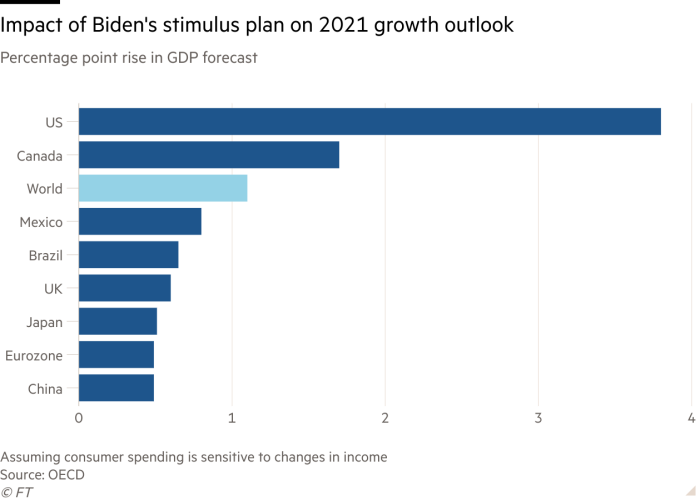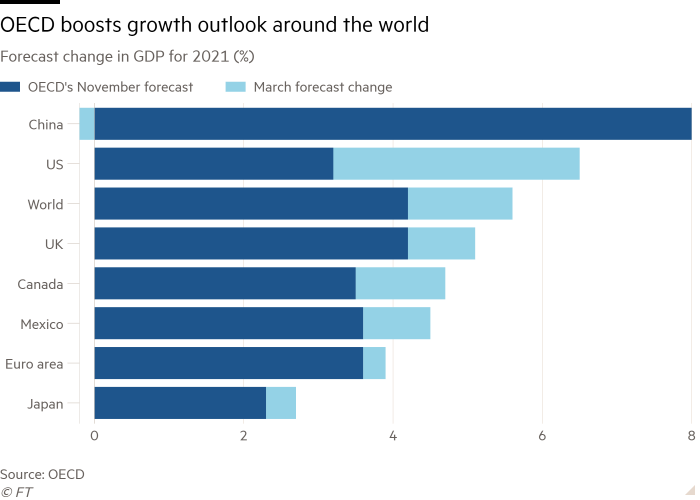Joe Biden’s $1.9tn US stimulus programme will boost the economic recovery from the coronavirus pandemic around the world, the OECD said on Tuesday, as it upgraded its outlook for global growth.
The Paris-based international organisation said it expected a stronger rebound from last year’s historic recession than it forecast in November, mainly because of the rapid rollout of Covid-19 vaccination programmes in many countries and the increase in US stimulus spending.
The scale of the Biden plan will add about 1 percentage point to global economic growth in 2021, Laurence Boone, the OECD’s chief economist, told the Financial Times.
As a result, the global economy will expand by 5.6 per cent this year, the OECD forecast on Tuesday, an upgrade of 1.4 percentage points from its November forecast.
The stimulus bill — known as the American Rescue Plan — is one of the largest US government interventions in the economy of the post-second world war era. It is expected to be passed on Tuesday by the Democrat-controlled House of Representatives after the US Senate voted to approve the package on Saturday.

The stimulus plan has helped add fuel to a powerful shift in global equities markets. Companies considered beneficiaries of stronger economic growth, such as banks and airlines, have begun rallying, while tech stocks such as Netflix and Amazon that performed strongly during the height of the Covid-19 crisis have pulled back in recent weeks.
It has also triggered a sharp sell-off in the bond market, as expectations for more rapid US price growth have been sharpened. Higher inflation is bearish for bonds, since it eats into the fixed income streams that they provide.
The Biden package was “trying to kickstart a new episode where you have higher growth and you move away from too-low inflation”, Boone said, although she added that “it would have been nice” to see “a little more” of the money spent on investment.
The OECD substantially revised up its expectations for US growth this year, from 3.2 per cent in its November forecasts to 6.5 per cent.
Because of their trade connections to the US, Canada and Mexico are also both set to benefit from the US stimulus, which will boost their growth this year by about 1 percentage point compared with November’s forecast, the OECD estimated.
In Europe the boost will be closer to 0.5 percentage points, as the positive effects of the Biden stimulus will be partly offset by the lag in vaccination programmes, which will delay the loosening of coronavirus restrictions and generate a longer hangover from the crisis, the OECD warned.
Boone said: “Europe is not doing enough on the vaccine. Countries are supporting their economies and that is very welcome, but before adding to the existing stimulus they should speed up vaccination and reopen their economies.”
The OECD revised upwards its forecast for the UK for both 2021 and 2022 by 0.9 and 0.6 percentage points respectively as a result of its successful vaccination programme.

The US stimulus package will increase domestic inflation, but not to a dangerous level, Boone said, because “there is a lot of slack in [US] labour markets”. Although there will be “some temporary [price] pressures in some areas”, she argued the stimulus was unlikely to result in generalised upward pressure on all wages, which would drive persistent inflation.
And investors’ expectations of inflationary pressures in other regions, such as Europe, were less likely to materialise, she added, in part because vaccination programmes were progressing more slowly.
The upbeat US outlook will also help mitigate the longer-term scars left by the crisis, the OECD said. Advanced economies will be close to their pre-pandemic growth path by the end of next year, it estimated.
Emerging economies will fare less well, remaining 3 to 4 per cent below their pre-virus output path by that time, the forecasts show, although this would be a much better outcome than the OECD forecast just three months ago.

“The amazing fiscal support everywhere means that we have preserved the economic fabric across OECD countries. Even in emerging markets we’ve seen amazing policy support,” Boone said.
Countries most dependent on tourism face the greatest challenges in securing a stable recovery, the OECD warned, while its overall optimistic outlook depends on the successful acceleration of the production and distribution of Covid-19 vaccines.
It also assumed the world would remain largely free from vaccine-resistant mutant strains of the virus.
To keep the recovery strong, the OECD recommended that countries should first ensure they have a robust vaccination strategy and maintain strong fiscal support to boost growth, and then shift government support into high-growth areas of the economy such as digital and green investment.
“Early signalling of future alignment of long-term price signals with environmental and climate policy objectives, including through carbon pricing, would lower environmental policy uncertainty and improve the prospects for the funding of investments in clean technologies,” the OECD said.
Additional reporting by Adam Samson
https://news.google.com/__i/rss/rd/articles/CBMiP2h0dHBzOi8vd3d3LmZ0LmNvbS9jb250ZW50LzdmN2Q0YjdkLTAyOGEtNDFhNi1iMTFlLTgzMjAxNzNhZTRiY9IBP2h0dHBzOi8vYW1wLmZ0LmNvbS9jb250ZW50LzdmN2Q0YjdkLTAyOGEtNDFhNi1iMTFlLTgzMjAxNzNhZTRiYw?oc=5
2021-03-09 10:00:03Z
52781425548951
Tidak ada komentar:
Posting Komentar